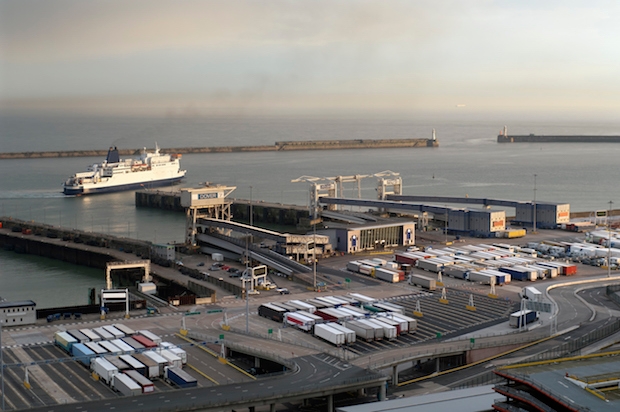Anyone who has followed the news over the past 18 months could be forgiven for thinking that, in our ongoing debate around Brexit, Dover is the only port currently operating within the UK. Its fate, it seems – and by implication, the fate of our other ports – is tied so closely to the outcome of our negotiations that if the right deal isn’t struck, every port in the country will become inert, with roads throughout the UK gridlocked with queues of lorries. Perhaps there’s something symbolic in this focus on Dover, our closest connection to the continent and, for many people, their route of holiday travel to Europe.
But while Dover is an important gateway, there is much more to British ports. According to the Department for Transport, 94 percent of trade and traffic passing through UK ports moves through ports other than Dover. The perceived problems our ports are facing are often overstated, and in some cases unfounded.
This isn’t to say that concerns about ports and Brexit are invalid, however. There is risk involved, though these risks centre on specific forms of traffic: according to the Department for Transport, lorries with drivers going to and from the European Union represented 8 percent of all UK port volumes in 2016, heavily concentrated in Dover. With more than four times as much freight passing between the UK and Northern Ireland via sea routes than over the land border with the Republic of Ireland, a ‘sea border’ would be very disruptive to trade within the UK. And of course there is a wealth of detailed regulation that needs to be disentangled. But ports and logistics companies across the UK are working closely with the Government and its agencies to mitigate these challenges.
In most of our other major ports – including the container-handling ports processing most of our growing trade with China and other Asian countries – there are systems already in place for handling huge volumes of non-EU trade. These work well and will continue to do so, but they receive little attention. It’s because of these that we have long enjoyed products such as lamb from New Zealand, clothing from Asia and timber from Scandinavia, all of which enter the country without so much as a hitch.
And we can’t lose sight of the fact that many ports are finding opportunities in our departure from the EU. Alternative routes have been prioritised by logistics companies and substitutes for congested routes are being put in place. Investment in our major ports continues at a significant level. And given that the UK’s major port sector is unique in Europe in that it is privately run and owned without the need for Government subsidies, Brexit also presents a chance to create a better pro-investment policy framework.
Those of us in the sector never fail to remember that ports have always been vital cogs in the machinery of civilisation. Trade between the nations of the world through ports has brought about prosperity for nations, choice and affordability for consumers, and job opportunities for coastal communities and the wider economy. Indeed, many of the UK’s great cities owe their historic success to the fact that they are ports, and Britain’s island nation geography means that seaborne trade – 95 percent of all the goods entering or leaving the country – is as important today as it has ever been.
While the fate of Dover eats up column inches, Britain’s other ports are preparing for all scenarios, readying themselves for trade both with the EU and the wider world. We’re seeing renewed interest in long-forgotten coastal communities, and the potential for their realisation as coastal powerhouses. It bears noting that the maritime sector can have a catalytic effect: not only on the ports themselves, but on the surrounding area. Ports use local land to build logistics parks and manufacturing facilities, and they invest in infrastructure, such as roads and rail, to aid the port development. Each pound spent on a road connecting a port to another area can add more than four pounds of value to the wider local economy.
But the mechanics of shrewd port management do not make newsworthy copy. Doom-and-gloom scenarios in which talks fail, the drawbridge is drawn up, and nothing comes in or out, do. But by emphasising the perceived challenges facing Dover we risk letting misconceptions mutate into false truths. Rather than downplay our competence in dealing with the complex machinery of trade and ignoring the historic adaptability of our ports and logistics sectors, we should instead send the message that we are open and ready for business. The port industry is aware of the challenges and rising to meet them.
A three-point plan is the order of the day. First, we must hardwire ‘trade’ into the Government and the regulatory framework, for instance by establishing a Cabinet Committee focused on trade and holding a review of key policy areas. Secondly, we must ensure we have the right level of connectivity between our main centres of economic activity and our global gateways; we should place more emphasis on the small number of strategic freight corridors responsible for the majority of trade movement in the UK, for example. Lastly, we must take advantage of our new flexibility to create a regulatory landscape appropriate for the UK’s unique ports sector. We could explore the potential of free ports to drive investment and create jobs along our coastline, and set environmental standards which remain high while also taking into account the specific circumstances of the country.
In doing all this, we can ensure we have the right conditions to take advantage of the opportunities available once we leave the EU. And in the meantime, Britain’s many ports will be keeping calm and carrying on, so as to meet and thrive on the unique challenges that the future holds.
Tim Morris is CEO of the UK Major Ports Group





Comments